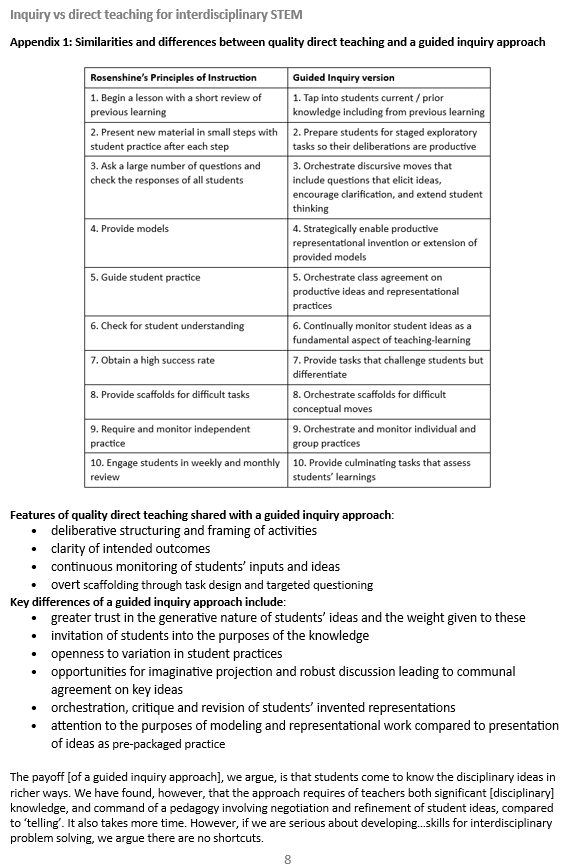Blanchelande College 2023 | New Staff Induction
Home › Forums › FOSIL Presentations › Blanchelande College 2023 | New Staff Induction
- This topic has 1 reply, 1 voice, and was last updated 2 years, 3 months ago by
 Darryl Toerien.
Darryl Toerien.
-
AuthorPosts
-
14th November 2023 at 11:46 am #81819
On 14 November 2023, we presented an induction session on FOSIL-based inquiry (PPT download) to new staff at Blanchelande, although the presentation is not limited to this audience.
Most of the slides have explanatory notes.
Slide 8 refers to this excellent article – Inquiry vs direct teaching for interdisciplinary STEM (Tytler, 2019) – which, while focused on STEM, is not limited to STEM. Of particular interest, which I extracted in an Appendix (see below), are:
- Similarities and differences between quality direct teaching (a la Rosenshine) and a guided inquiry approach
- Features of quality direct teaching shared with a guided inquiry approach
- Key differences of a guided inquiry approach
- Conclusion
 15th November 2023 at 12:20 pm #81830
15th November 2023 at 12:20 pm #81830Our induction session raised a point of clarification and a question, which I share here from the perspective of building a community of inquiry.
Clearly, not all learning needs to happen through an inquiry involving all six stages in the process. However, it is difficult to imagine any learning that does not involve one or more of the stages. Having said that, students will not fully develop as engaged and empowered inquirers if they never experience a full inquiry involving all six stages of the process in each of our disciplines. The reason for this is that inquiry is a fundamental human response to reality – What! Why? I have been thinking about this in Whitehead’s* terms of there being only one subject-matter for education, which is life in all its manifestations (p. 10), which our students encounter in school primarily as subjects/ academic disciplines. Elsewhere, he says:
“From the very beginning of their education, the child should experience the joy of discovery. The discovery which they have to make, is that general [conceptual] ideas give an understanding of that stream of events which pours through their life, which is their life.” (p. 3)
This is why we pursue disciplinary knowledge from a stance of wonder and puzzlement, and in an interdisciplinary way, because the manifestations of life/ reality ought to cohere meaningfully, and we have an important opportunity/ responsibility to facilitate this.
X’s question about making Rosenshine and FOSIL-based inquiry explicit in our planning – with important distinctions between medium term planning and individual lesson plans – was in part addressed by Y’s observation on the similarities between quality direct teaching as formulated by Rosenshine and a guided inquiry approach. This is the reason why Tytler’s article is so important, because his table expresses Rosenshine’s principles in terms of an inquiry stance and process, so any explicit occurrence of one or more of Rosenshine’s principles is also potentially a meaningful occurrence of its inquiry equivalent, and vice versa. While these ‘principles’ can’t be neatly assigned to stages in the inquiry process, they may indicate which stage(s) is involved. For example, while Tap into students current/prior knowledge including from previous learning will always be a feature of Connect [and the start of an inquiry], it would likely also be the starting point for a lesson/ series of lessons just focusing on the Construct stage of the inquiry process [because students can’t build knowledge and understanding from nothing in Construct, which is why it follows on from Investigate].
As Z pointed out, this all gives us great flexibility in how together we go about enabling our individual students to develop as engaged and empowered inquirers within our disciplinary communities of interdisciplinary knowledge – a journey of heroic inquiry that we are always making with them.
—
*”Alfred North Whitehead (1861–1947) was a British mathematician and philosopher best known for his work in mathematical logic and the philosophy of science. … Although there are important continuities throughout his career, Whitehead’s intellectual life is often divided into three main periods. The first corresponds roughly to his time at Cambridge from 1884 to 1910. It was during these years that he worked primarily on issues in mathematics and logic. It was also during this time that he collaborated with Russell [notably on the Principia Mathematica]. The second main period, from 1910 to 1924, corresponds roughly to his time at London. During these years Whitehead concentrated mainly on issues in physics, the philosophy of science, and the philosophy of education. The third main period corresponds roughly to his time at Harvard from 1924 onward. It was during this time that he worked primarily on issues in metaphysics.”
From <https://plato.stanford.edu/entries/whitehead/>
Whitehead reference: Whitehead, A. N. (1929). The Aims of Education and Other Essays. New York, NY: Macmillan.
-
AuthorPosts
- You must be logged in to reply to this topic.


